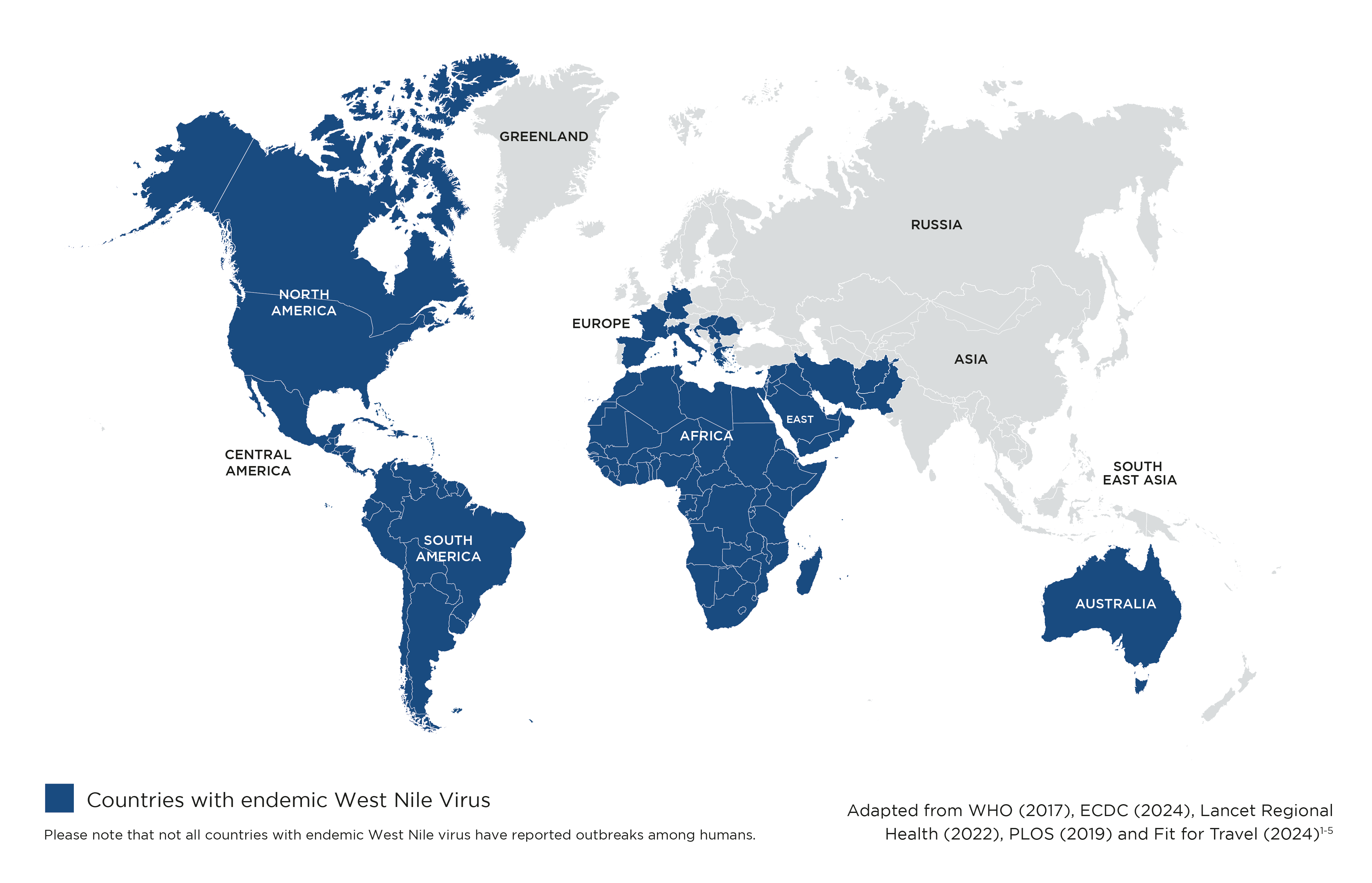The mosquitos that spread West Nile virus are infected when they feed on infected birds.1 Humans are ‘dead-end’ hosts, meaning they do not spread the infection.1
Risk areas for West Nile Virus

FAQs
-
Key fact
-
How do you get West Nile virus?
Most often, people get West Nile virus when they are bitten by an infected mosquito.1 Sometimes, the virus can be spread by contact with other infected animals, and very rarely, the virus can be spread through organ transplant, blood transfusions, and breast milk.1
-
Which countries are affected by West Nile virus?
West Nile virus is prevalent throughout Africa, parts of Europe, the Middle East, West Asia, Australia, and in the Americas from Canada to Venezuela.1
-
What are the symptoms of West Nile virus?
In around 80% of infected people, West Nile Virus causes no symptoms. In a minority of cases, it can lead to West Nile Fever or severe West Nile disease.1
The symptoms of West Nile fever include fever, headache, tiredness, body aches, nausea, and vomiting, and occasionally a skin rash and swollen lymph glands.1
-
How serious is West Nile virus?
Severe West Nile disease occurs in approximately 1 in 150 people infected with West Nile virus. Symptoms of severe disease include headache, high fever, neck stiffness, stupor, disorientation, coma, tremors, convulsions, muscle weakness, and paralysis.1
-
Can I prevent getting West Nile virus?
You can take the following precautions to help reduce your risk of infection:
- Visit your nearest convenient pharmacy or specialist travel health clinic for a risk assessment before your trip
- Use a recommended insect repellent containing either Picaridin, DEET, PMD or OLE (oil of lemon eucalyptus), IR5353 or 2-undecanone1,6
- Wear appropriate clothing (e.g. loose fitting long-sleeved clothes, long trousers, socks and shoes) to minimise exposed skin7,8
- Use mosquito nets if you are sleeping or resting in unscreened accommodation or sleeping outdoors during the day or night7
- Use gloves and other protective clothing when handling sick or dead animals1
Ready to get started? Check now for your nearest travel health clinic.
Get friendly advice from the UK's largest network of travel clinics*.
* This list is not exhaustive and other travel health providers are available.
References
- World Health Organization. West Nile virus. October 2017. Available at: https://www.who.int/news-room/fact-sheets/detail/west-nile-virus. (Last accessed April 2024).
- European Centre for Disease Prevention and Control. West Nile virus – distribution of human infections, 2023. February 2024. Available at: https://www.ecdc.europa.eu/en/publications-data/west-nile-virus-distribution-human-infections-2023. (Last accessed April 2024).
- Lorenz A and Chiaravalloti-Neto F. Why are there no human West Nile virus outbreaks in South America? Lancet Regional Health – Americas. 2022;12:100276.
- Eybpoosh S, Fazlalipour M, Baniasadi V, et al. Epidemiology of West Nile Virus in the Eastern Mediterranean region: a systemic review. PLoS Negl Trop Dis. 2019;13(1):
- Fit for Travel. Destination: Middle East. Available online: https://www.fitfortravel.nhs.uk/destinations/middle-east. (Last accessed April 2024).
- Centers for Disease Control and Prevention. Yellow Book 2024. Section 4: Environmental Hazards & Risks. Mosquitoes, Ticks & Other Arthropods. May 2023. Available online: https://wwwnc.cdc.gov/travel/yellowbook/2024/environmental-hazards-risks/mosquitoes-ticks-and-other-arthropods. (Last accessed April 2024)
- UK Health Security Agency. Mosquito bite avoidance: advice for travellers. January 2023. Available online: https://www.gov.uk/government/publications/mosquito-bite-avoidance-for-travellers. (Last accessed April 2024)
- Fit for Travel. General Travel Health Advice. Mosquito Bite Avoidance. Available online: https://www.fitfortravel.nhs.uk/advice/malaria/mosquito-bite-avoidance. (Last accessed April 2024)
UK-BOTB-2400002 April 2024
